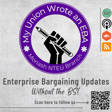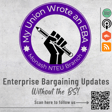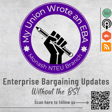Become a Creator today!Start creating today - Share your story with the world!
Start for free
00:00:00
00:00:01

Episode One: Bargaining 101
This is the first episode of My Union Wrote an EBA, where we - members of the Monash Branch of the NTEU - chronicle the progress toward a new Enterprise Bargaining Agreement (EBA - also called an Enterprise Agreement, or EA).
In this episode co-hosts Kate & Tony take us through some of the basics of bargaining and what to expect from the process.
If you have questions about the process you'd like answered, drop us an email at myunionwroteaneba@gmail.com
You can stay up to date with everything happening with bargaining and at the branch by following us on social media:
Facebook - https://www.facebook.com/NTEUMonashBranch
Twitter - https://mobile.twitter.com/nteumonash
Transcript
Progress on Monash University's Enterprise Agreement
00:00:13
Speaker
G'day, everyone, and welcome to My Union Wrote an EBA. This is a podcast to chronicle the progress towards a new enterprise bargaining agreement at Monash University and is brought to you by members of the Monash branch of the NTEU. We're here to take the old agreement and hashtag change it.
Acknowledgment of Kulin Nations Custodians
00:00:29
Speaker
And unlike our namesake, my dad wrote a porno, do everything we can to avoid being fucked in the process.
00:00:35
Speaker
Those involved with the podcast would like to acknowledge that it is being recorded on the unceded lands of the Kulin nations, on whose lands we live, teach and work.
00:00:45
Speaker
We would like to acknowledge and pay our respects to the traditional custodians and elders, past and present, and to the continuation of the cultural, spiritual and educational practices of Aboriginal and Torres Strait Islander peoples. Always was, always will be, Aboriginal land.
Introductions: Tony and Kate
00:01:01
Speaker
My name is Tony, pronouns he, him, and I am a casual teaching associate at Monash in the Faculty of Arts, teaching history and international studies.
00:01:11
Speaker
Hi Tony, my name's Kate and I use she her pronouns. I'm a PhD candidate in Film, Media and Journalism at Monash University and I also have held a bunch of casual contracts for various different unis including Monash since 2014. So before we kind of get into what the podcast is all about, Tony, how did you get involved in the union?
00:01:33
Speaker
So I've been a union member at the NTAU since I started at Monash in 2014, but got significantly more involved at the beginning of the pandemic when all of the stuff around the Jobs Protection Framework was happening. How about you, Kate?
00:01:49
Speaker
So again, like you, I've been a member of the union since I started working as well, but I started to get a lot more involved in the union during COVID. Basically Monash tried to take one of my tutes away in mid semester, I think around week six, which was very stressful in terms of like being able to pay rent and all that kind of stuff.
00:02:16
Speaker
basically pissed me off. So I sort of started to look in and to see what more I could do with union. And Kate and I will be the main voices that you'll hear on the podcast. There'll be other people that come in for different episodes and different reasons, and we'll be sure to give them the opportunity to intro themselves when they do.
00:02:34
Speaker
Yeah, for sure.
Podcast Objectives and Member Involvement
00:02:36
Speaker
So basically the reason we wanted to start this podcast was to keep people updated about the progress of the enterprise agreement that we're currently negotiating with the union management and to demystify the process of bargaining because it is really confusing as I found out, as I started to get more involved in the union.
00:02:59
Speaker
and also to involve members in the process of bargaining. And to give you all listening out there an opportunity to ask questions you might have about the process. So the podcast will drop fortnightly, timed after every bargaining meeting. There might also be times where we drop bonus episodes or extra episodes in for special occasions or different things that we feel like need to be explained, but there will be a regular fortnightly episode that comes in after each of the bargaining meetings.
00:03:29
Speaker
Yeah, exactly.
What is an Enterprise Agreement?
00:03:30
Speaker
And we'll basically be breaking down the process of bargaining, telling you what's happening in the actual bargaining room and keeping you abreast of union activities and events and all the goings on with the union. It's okay. Let's start right at the very beginning. What is an enterprise agreement?
00:03:49
Speaker
So basically all an enterprise agreement is, is an agreement that's drawn up between the employer and its employees that sets out the terms and conditions of employment. So things like wages, your conditions in the workplace, all those sorts of things. And basically an enterprise agreement or an EA, which is often shortened to.
00:04:09
Speaker
guarantees better conditions than the award minimums. And so what is actually involved in negotiating a new enterprise agreement? So the first steps before we can even get to the process of bargaining is the university management first of all has to issue a NER which is short for a notice of employee representational rights.
00:04:29
Speaker
And that's really just a document that says, yep, we're ready to bargain. Then as well, each group, so the management and the union, has to do a log of claims. And a log of claims is basically just a list of things that they're bargaining for and changes that each side wants to make in the enterprise agreement and give it to the other group and publicise it to the university staff at large.
00:04:50
Speaker
Do we currently have an enterprise agreement in place or has the one had run out already? So unfortunately, the enterprise agreement that we are covered under expired on the 30th of June this year. So that's 2022. But even though it has expired already, we're still covered by it. But because it has expired, it freezes conditions and scheduled pay rise. So there'll be no increase in conditions or any pay rises under that EA.
00:05:17
Speaker
Right, so that's almost four months now since the last agreement expired. Why are we only just starting bargaining now?
Union's Delay Due to Management's Response
00:05:25
Speaker
Yeah, that's a really good question, Todie. So the union first contacted management to begin the process of bargaining way back in April of this year. And it took two whole months for the union to get an email response from management. So pretty good email if it takes two months to write there. And that's really set the tone for what bargaining is like.
00:05:49
Speaker
So it seems like they're pretty clearly trying to delay this process and even delay the beginning of this process. Why? What's in it for them? So as I said, the wages and conditions are essentially frozen until we get a new EA in place. So we don't get a pay rise and the uni basically saves money on wages until we get that new EA in place.
00:06:13
Speaker
Management also think that the longer the process drags on, the more likely we are to basically settle for something shit. And they're pretty good at delaying these things. I found out today that the last agreement took two and a half years from the beginning to completion. And so it would be nice if that could not happen again.
Regulations and Impact of Industrial Action
00:06:36
Speaker
While they are doing these delaying tactics, though, why can't we just strike until we get what we want or can we?
00:06:43
Speaker
Yeah, so this is something I totally didn't get to recently either. So basically for a long time industrial action wasn't regulated at all. So you could strike at any time for any reason, but basically if you did strike, you'd be at risk of getting fired. Since the 1980s, the Australian government, so both the Liberal Party and the Labor Party,
00:07:04
Speaker
started to regulate industrial action more strictly. So this was really good in the sense that people could take protected industrial action, which was basically protected by law. And that meant that people taking protected industrial action couldn't get fired for that action. But then it also set some really restrictive limits on when you can do protected industrial actions like strikes and for what reason.
00:07:30
Speaker
And unfortunately, that legislation is weighted really, really heavily in the employer's favour. And so what kind of things constitute industrial action? Is it just strikes?
00:07:40
Speaker
So not just strikes, but that is a big one. It's basically anything that's organized by the union that interrupts your regular work day. So it could be something as small as a little 30 second speech that a worker gives or a group of workers give in their tutorials or in lectures or even something in their emails. Because for those 30 seconds, you're not teaching or doing work when you normally would be. So that's counted as interrupting your regular work day and therefore counted as industrial action.
Legal Steps for Protected Industrial Action
00:08:10
Speaker
So is there a legal process that we have to go through before we can strike them? Yeah, there is. So for industrial action that's protected by law, there is a very complicated legal process. So we can only take protected industrial action after bargaining officially starts. So that was quite recently.
00:08:34
Speaker
We also have to go through a legal process which involves things like proving to the Fair Work Commission that management isn't bargaining in good faith. And this is a whole big complicated thing that I think you and I are both keen to do a whole episode about in the future, so stay tuned everyone.
00:08:54
Speaker
Yeah, there's definitely a lot there that needs to be unpacked and for it to be properly understood. So what can people do in the meantime? So a big one is to talk to your colleagues, talk to them about the union, talk to them about the process and this podcast as well.
Union Leverage Through Merchandise
00:09:09
Speaker
Another big one is displaying union merch in your workplace. So the logic behind that is basically the more visible the union is, the more leverage we have. The union actually has some coffee stalls coming up where you can come chat, get a free coffee and get your hands on some of that lovely union merch as well. So if you follow the branch on Facebook and Twitter and you can find the link to those in the pod description.
00:09:34
Speaker
you can find out when the next coffee stall is. And then the other big thing is rallies. So the union's actually having a barbecue on the 1st of December. So again, keep your eyes peeled for more info on that. And then the last big one that I'm sure you can tell us more about Tony is listening to the pod and help spreading word about it.
00:09:52
Speaker
And really, that's what doing this podcast is all about. It's for us to be able to work together, to ask each other questions, to get involved and to keep each other updated about the process and about the progress of the negotiation.
Listener Interaction and Future Topics
00:10:03
Speaker
Yeah. And so we don't let management get away with things just because the process is long and confusing.
00:10:09
Speaker
And if there's anything that you're unsure about or if you have questions about bargaining or any of this, drop us an email. You can reach us at myunionwroteanaba at gmail.com and we'll get someone to answer it on the pod.
00:10:22
Speaker
Yeah, we'd love to hear your questions and get some people to answer them. So next episode, we'll look at the union's log of claims and compare it to the management's log of claims so that we can give all our members a good idea of the key differences between the union's position and management's position and show what we're going to be arguing about during the course of this enterprise bargaining agreement. So we'll see you all in two weeks.
00:10:47
Speaker
Alright folks, that's it for this episode. Thanks to Kate, Danny, Adam, Bernard, and Pod Daddy Sofio for all the work they've put into this, and we'll catch you next time.


